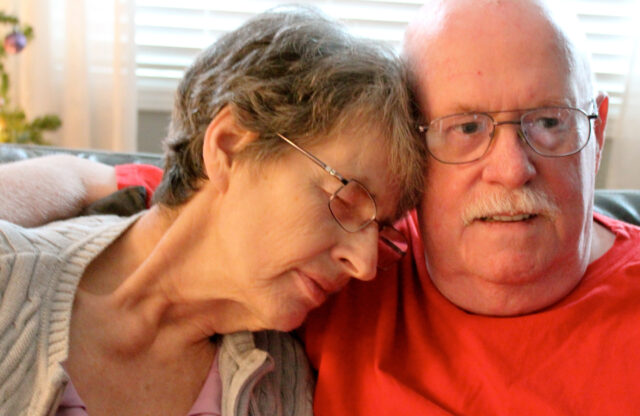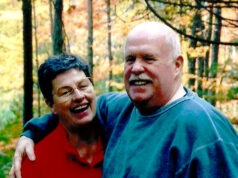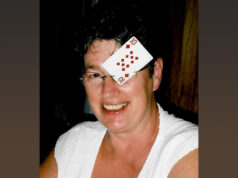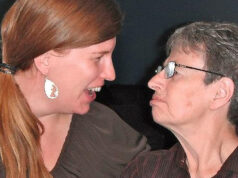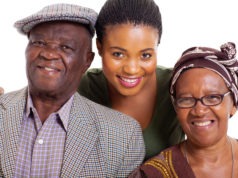If you’re a caregiver for someone with a chronic condition, you’ll appreciate this hour, as Suzanne is joined by Lianna Marie, author of ”The Complete Guide for People With Parkinson’s Disease and Their Loved Ones” and the upcoming book ”The Parkinson’s Path.”
After denial, some go through an anger phase. It’s a thing and we shouldn’t ignore it. For Lianna’s mother, her independence was being taken away, a frustrating situation for anyone. “There were lots of tiny moments where anger came out. Anger and defiance – I’m staying in my house no matter what – are feelings of vulnerability.” Lianna provides tips for how to deal with it. Understand where your anger is coming from, and let it out, and find constructive ways to let it out. Acknowledging it goes a long way.
Learn more at Lianna’s website, All About Parkinson’s.
Lianna Marie: some of us can get into that anger phase and not everyone experiences that, but certainly with my mom. Um, and myself at different stages of mom’s illness, we experienced this, what I call my least favorite emotion. I’m not very good. I’m not, I gotta admit, I’m not, I’m not very comfortable with anger and nor was my mom pretty calm quiet person most of her life. Um, so anger is a thing. It’s a thing and I think we should talk about it because it does come up and if we ignore it, then we can’t, you know, we shouldn’t ignore it. How about that? So, so tell us about your mom, How did anger show up?
Lianna Marie: Yeah. For her. Um, I’m smiling because you know, we can laugh about it now. But you know, I remember one day in general, I can’t blame her for being angry. Um, you know, her independence was being taken away and I would say that is the most frustrating angering aspect that she experienced or one of if not the most frustrating for anyone who’s losing their ability to move do the things that they love. You can’t blame her. So I just wanna put that out there. I don’t blame her for being angry. But I remember later on in the illness, One of the things, a story that my aunt told us about was the day my mom threw her purse at my aunt and which seemed like like mom’s throwing her purse like what’s going on? My Aunt was delicately trying to explain to my mom hey, by the way, you know, you keep asking for all these things to get for the care partner, which was dave at the time to do for you. Maybe you shouldn’t be asking so many things, right? And mom saying, hey, I’m the one with Parkinson’s, you’re not right. Like don’t you tell me what to do? So she throws, she’s like, you know, that kind of don’t get me wrong. My mom wasn’t a violent person. But in that moment she’s like, hey, excuse me, I’m the one I have the disease, you get out of here. So, so any time, you know, you got, it was just one of those and there’s lots of little moments like that where my mom kind of blurted out her anger and like I said, it’s, it’s normal. I, I totally understand why she felt that way. Um, part of her inability to accept where she was at was probably part of the problem. So she was maybe not fully and grasping the fact that she was losing her independence and she didn’t like that. So, um that’s how it showed up. And for me, I would say my anger showed up a lot at the end when I was just angry about I was little, I guess I’m angry that Parkinson’s was taking my mom away from me.
Suzanne: And I think the thing is if somebody is taking care of a loved one or they have a loved one that is failing um senior loved one, how many times do we see a senior loved one that may be at home? They know they’re failing you have that family conversation and they say no, I’m not doing anything. You know, I’m not going to move into a step of care, I’m going to stay here in my house until you have to roll me out, you know feet first kind of thing, you know, and when we, when we look at these kind of, you know, scenarios, that’s a combination, I think of denial and about anger because it is this feeling of vulnerability, it’s feeling of, you know, how you can do that. So, um you know obviously these are all dynamics that people go through, you know, as they’re aging, as they’re losing their faculties, either mental or physical or mobility etcetera. So what tips do you have for someone that’s feeling this way, Lianna?
Lianna Marie: Well, that’s a great question. One of the things I would was a Eureka moment when I read this quote by C. S. Lewis and and it says I sat with my anger long enough until she told me her real name was grief and I think for me it’s like, yeah, you know what it, I am grieving and this is, it helped me understand where my anger was coming from, and I think it’s just um and and and and by understanding it, and for me, one of the biggest things was being to let myself feel that feeling, you know, let it out, let it go, find constructive ways to to to deal with my anger for me that was exercise, um getting outside doing things I love and being with the people that I love. Um but just acknowledging it was a big was a big was actually one of the biggest tips was to say, you know what this actually might look like grief more than it is anger.
Suzanne: Absolutely, Absolutely. And I think the other thing that we really have to look at in this whole process is the fact that being, being in the moment we’re gonna feel all different types of emotions. I remember with my mom we came to a loggerhead, the two of us, she was treating me terribly. She was angry with me because she was in the situation she was in, I was angry with her because guess what? She was moved to Seattle where I lived and I liked her being up in my hometown, right? I didn’t want her under my foot. And all of a sudden here we were faced with this new change, the two of us. But she, you know what it really got me thinking, you know I learned to shift thanks to a counselor. And that was the fact that you know I said to my mom mom the greatest gift I have been given is having you to myself. I’ve never had just you with me and it was like this big light bulb that came on with both of us. It’s like this is a gift that we’ve all been given and to be able to take this information and shift it. Um It helped us shift and grow together. Yeah. So Lianna again, tell us a little bit about your books and how we reach you.
Lianna Marie: Yes. If you just want to go to all about Parkinson’s dot com, you can get our free tips book there and you can learn more about my books and how, whether you’re a person with Parkinson’s or a caregiver care partner, um we have books there on on there if you want to check them out.
Suzanne: Yes, absolutely. And you know, Lianna is so great, she has a lot of content on answers for elders and we’re looking forward to having a lot more of what she does and how we can help families. Not only that are, you know, dealing with Parkinson’s disease, but there’s so much more that are so many parallels to what you went through with your mom liana. You’re such a wealth of information. So we’re thrilled to have you. And also just remember to grief, I want want you to before we sign off. What is that quote again?
Lianna Marie: I sat with my anger long enough until she told me her real name was brief.
Suzanne: That’s perfect. So everyone Lianna and I will be right back, right after this.






